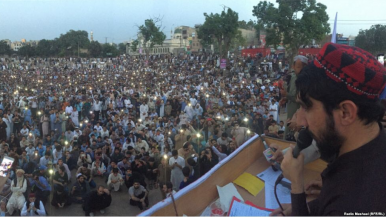By Daud Khattak
Pakistan’s intrepid rights movement suffered its first casualty — allegedly at the hands of the country’s law-enforcement agencies — exactly a year after its inception.
Muhammad Ibrahim Arman Luni, a college teacher and rights activist, died in the hospital after reportedly being beaten up by police in Balochistan province on February 2 in a bid to arrest him after a peaceful sit-in protest.
The Pashtun Tahafuz Movement (Pashtun Protection Movement or PTM), was launched in the wake of the killing of a tribal youth and an aspiring artist, Naqeebullah Mehsud, in what an official inquiry committee called a fake police encounter in Pakistan’s port city of Karachi last year.
Since then, PTM has treaded a thorny course by challenging the state’s powerful security establishment. Meanwhile, Pakistan’s thriving electronic media, political leadership, civil society, and rights groups have adopted an inexplicable silence over issues relating to alleged human rights violations and restrictions on civil liberties.
Over the course of one year, PTM and its leadership were labelled as traitors, disloyal, and anti-state; their struggle was criticized as “fifth generation hybrid warfare” by opponents. Supporters, on the other hand, justify the group’s criticism of Pakistan’s security agencies for what they call human rights violations during the anti-Taliban military operations in the tribal areas bordering Afghanistan.
Notwithstanding arrests of its members and activists by police and state security agencies over the past one year, the group’s track record shows its members and leadership always used nonviolence as their strongest weapon, recalling the history of the 20th century nonviolent Khudayee Khidmatgar Movement in the region.
Cool, calm, straightforward, steadfast, and articulate, PTM’s charismatic leader Manzoor Pashteen is seen as the modern-day anaologue of Abdul Ghaffar Khan, aka Bacha Khan, the 20th century reformer who trained his fellow Pashtuns on how to fight a nonviolent struggle for the independence of India from the British Raj. Bacha Khan’s followers adopted the name of Khudayee Khidmatgars (or servants of God).
While the killing of Naqeebullah Mehsud acted as a catalyst, broader allegations regarding enforced disappearances or missing persons, the presence of unexploded landmines, and security check posts before entering Waziristan are said to be the real impetus behind PTM.
Almost all top politicians, including then opposition politician and now Prime Minister Imran Khan, visited the PTM’s first-ever sit-in protest in Islamabad in February last year to express sympathy with the newly emerged rights movement and its demands.
However, since then the political leadership has distanced itself from the group. More than that, both print and the 24/7 electronic media also dropped the PTM protest rallies, gatherings, and even arrests of its activists and leaders from their daily agendas as the group’s stance over the issue of missing persons continued to stay unchanged.
Missing persons are the undeclared detainees allegedly picked by the intelligence agencies on charges of connection with the militants. Their relatives don’t know their whereabouts or whether they are alive or dead. Rights activists say such cases are mostly reported from the tribal districts, Khyber Pakhtunkhwa, and Balochistan provinces.
Pakistani authorities admit that missing persons are a genuine issue but question the number mentioned by the PTM activists. Former chief justice of Pakistan Iftikhar Muhammad Chaudhry even took suo moto noticeregarding the cases of missing persons. The issue has also been raised in Pakistan’s parliament, albeit without being taken to the logical conclusion.
Authorities, on the other hand, have resorted to an undeclared ban on PTM media coverage besides opening criminal investigation cases against its activists and leaders. For example, vocal PTM activist Alamzeb Khan Mehsud was arrested on charges of rioting and inciting hatred on January 21 in Karachi. A young and educated tribal youth, Mehsud has been documenting cases of enforced disappearances over the past year. He was one of the leading organizers of a big sit-in protest in Karachi on January 20. Despite the de facto ban on PTM coverage in the media, Mehsud’s arrest was widely highlighted on social media platforms.
Yet military spokesman Major General Asif Ghafoor, in an interview with ARY television in January, called the group a “nonviolent movement campaigning for its demands” and said that the army wishes the PTM and others would join the state in the rehabilitation phase in the erstwhile Federally Administered Tribal Areas. Ghafoor’s comments came just a month after his warning for the PTM “not to cross the red line.” Perhaps the power of PTM’s resilience changed some minds in Pakistan’s security establishment.
Arman Luni’s death, allegedly caused by a police beating on February 2, will further antagonize and alienate the youth already frustrated with the arrest of their colleagues and restrictions on the movement of the group’s leadership.
Expressing concern over the media blackout on the PTM’s activist killing, former Senator Farhatullah Babar said in a tweet, “By remaining silent, mainstream media is undermining itself. Speak up for the oppressed today so that tomorrow others speak up when you are oppressed.”
Pointing to the seriousness of the situation, columnist Saleem Safi warned of a catastrophe if the state and the protesting Pashtun youth failed to resolve the disputed issues at the earliest. In his Urdu language column titled “A Fresh Catastrophe at the Doorstep,” Safi writes that “the disaster-in-the-making appears to have more serious consequences than the war on terror if not resolved at this stage.”
For Pakistan, the positive aspect is PTM’s peaceful and nonviolent posture despite what the group’s leadership calls repressive measures on part of the state security apparatus. Against this backdrop, the onus lies with the state to listen before it is too late.

No comments:
Post a Comment